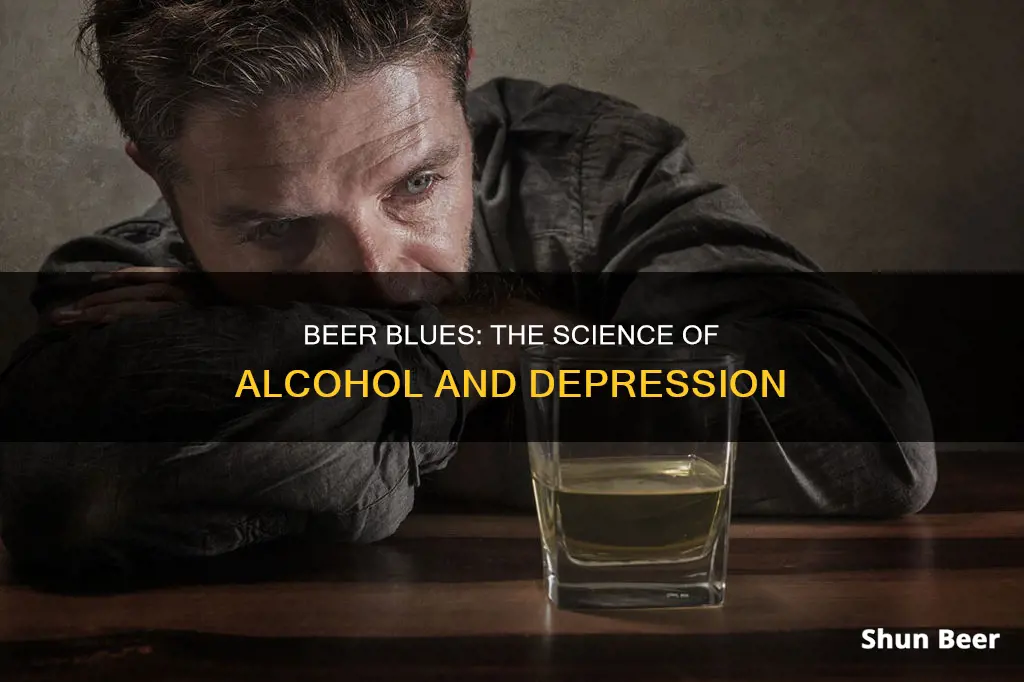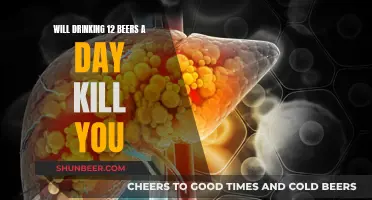
Alcohol is a central nervous system depressant, which means it slows down the messages between your brain and body. While it can make you feel calm and relaxed, alcohol can also lead to negative emotions, including depression. Many people experience a hangover the morning after drinking, which can include feelings of sadness or low mood, known as 'hangover depression'. This is due to the impact of alcohol on the brain, which can contribute to or worsen feelings of anxiety and sadness. While some people experience this after just one drink, for many it is a sign of heavy alcohol use.
| Characteristics | Values |
|---|---|
| Alcohol's impact on the nervous system | Alcohol is a central nervous system depressant. |
| Alcohol's impact on mood | Alcohol can help with negative emotions, but this is often temporary. |
| Alcohol's impact on sleep | Alcohol can help people fall asleep faster but disrupts REM sleep. |
| Alcohol's impact on stress | Alcohol can throw the body's stress response off balance. |
| Alcohol's impact on neurochemicals | Alcohol increases serotonin and dopamine levels while drinking but can deplete them over time. |
| Alcohol's impact on GABA | Alcohol slows certain neurons, acting as a sedative. |
| Alcohol's impact on the gut | Alcohol can cause imbalanced gut bacteria, making stress harder to manage. |
| Alcohol's impact on vitamin levels | Alcohol can cause a B vitamin deficiency, which is linked to depression. |
| Alcohol's impact on health conditions | Managing a health condition caused by alcohol increases the risk of depression. |
| Alcohol's impact on relationships and work | Alcohol can lead to relationship and work issues, which can increase stress and depression. |
What You'll Learn

Alcohol is a depressant
Alcohol acts on an inhibitory neurotransmitter known as gamma-aminobutyric acid (GABA). GABA makes nerve cells less able to send, receive, or create signals. In other words, it reduces activity in the brain.
The immediate effects of drinking alcohol can help you feel more relaxed, more confident, and less inhibited. However, as these short-term effects wear off, other effects begin to take hold, including feelings of anger, anxiety, depression, and other negative emotions. Alcohol can also cloud your brain, keeping you from seeing helpful solutions to problems.
Drinking alcohol can also deprive you of quality sleep. Quality sleep is one of the most important components of well-being, and a lack of sleep alone is linked to depression. Drinking alcohol might help you fall asleep faster, but it also disrupts REM sleep, which is when the body repairs and recharges the most. This is why it's common to feel tired after drinking, despite a full night's sleep.
Alcohol is easily abused and can be addictive. It is one of the most widely used and socially accepted drugs in the world. It is a common psychoactive drug, altering your consciousness, thoughts, and mood. It can be tempting to drink for the "mood-boosting" side effects, but this can lead to alcohol abuse or dependence.
Beer and TURP Surgery: What You Need to Know
You may want to see also

Alcohol affects your nervous system
Alcohol is a central nervous system depressant, which means it slows down brain activity. It can interfere with the release of neurotransmitters linked to mood regulation, such as serotonin and norepinephrine, resulting in lower-than-normal levels of these important chemical messengers. This can temporarily affect your speech, coordination, and energy.
Alcohol can also affect the brain's chemistry, leading to lowered moods and increased emotions. It interacts with the brain's receptors, interfering with the communication between nerve cells and suppressing excitatory nerve pathway activity. This can cause serious problems with cognition and memory.
The effects of alcohol on the nervous system can be both direct and indirect. Alcohol abuse can lead to severe neuro-immunological changes in the internal organs, including irreversible brain injury. It also reacts with the defence mechanism of the blood-brain barrier, leading to changes in the configuration of the tight junction of endothelial cells and white matter thickness of the brain.
In addition, alcohol-induced oxidative stress and inflammation can cause further damage to the nervous system. This can lead to neurodegeneration and neuronal death. Alcohol abuse can also disrupt the glucose transport system, which is essential for maintaining brain function, as well as impair the NMDA receptor, which plays a crucial role in synaptic plasticity and signal transmission.
Drinking Beer at Dollywood: What You Need to Know
You may want to see also

Alcohol impacts your mood
Alcohol is a central nervous system (CNS) depressant. This means that it slows down the communication between your brain and body, causing drowsiness, impaired judgment, and even loss of consciousness. While CNS depressants like alcohol can make you feel more relaxed, they often only help with negative emotions temporarily.
Alcohol and Your Neurochemicals
As soon as alcohol enters your bloodstream, it starts to change how your neurochemicals and central nervous system function. The neurotransmitter gamma-aminobutyric acid (GABA) slows down certain neurons and acts as a sedative. This can make you feel more carefree, especially if you were feeling tense and anxious before.
At the same time, alcohol triggers a release of dopamine, a neurotransmitter that affects how you perceive rewards and pleasure. This can make you feel almost euphoric. However, as the effects of alcohol wear off, so does the serotonin, which can leave you feeling a bit "bummed out".
Alcohol and Your Sleep
Drinking alcohol might help you fall asleep faster, but it also disrupts REM sleep, which is when your body repairs and recharges the most. This is why it's common to feel tired after a night of drinking, despite getting a full night's sleep. Bad sleep can easily affect your mood the next day, as exhaustion and lingering physical symptoms can make it tough to concentrate, leaving you feeling pretty low.
Alcohol and Your Emotions
If you're already feeling depressed, irritated, or anxious, alcohol can worsen these feelings. In fact, anxiety and depression days after binge drinking are not unusual. Drinking to cope with negative emotions can become a tricky cycle, as increased alcohol use will usually worsen negative mood states and physical health.
Alcohol and Your Brain Chemistry
Alcohol has immediate and long-term effects on your brain chemistry. Initially, alcohol triggers a flood of "feel-good" neurochemicals like dopamine, GABA, and various endorphins. This chemical cocktail elevates your mood and promotes relaxation. However, the more frequently you drink, the more diluted these effects become. Regular drinkers may increase their alcohol intake to try and regain the same "buzz" they felt before.
In the long term, when the brain is continuously exposed to alcohol, it accommodates these effects by altering its chemistry. For example, because alcohol increases dopamine and GABA, the brain will produce less of these chemicals to make up for alcohol's presence. Therefore, when alcohol is not in the body, you are left with lower levels of these important neurochemicals.
Beer and Bodybuilding: A Balancing Act?
You may want to see also

Alcohol alters your brain chemistry
Alcohol is a central nervous system (CNS) depressant. This means it reduces stimulation by slowing down the messages sent between your brain and body. While this can initially make you feel calm and relaxed, it can also lead to drowsiness, uncoordinated motor activity, and even loss of consciousness.
When you start drinking, alcohol enters your bloodstream and immediately begins to alter your brain chemistry. The immediate impact of alcohol use usually feels positive due to the release of "feel-good" neurochemicals like dopamine, GABA, and various endorphins. This chemical cocktail elevates your mood and promotes relaxation. However, the more frequently you drink, the more diluted these effects become, and you may find yourself drinking more to try and regain that feeling.
Alcohol also interferes with the release of neurotransmitters linked to mood regulation, including serotonin and norepinephrine. Lower-than-normal levels of these important chemical messengers can temporarily affect your speech, coordination, and energy. Over time, persistent changes in brain chemistry can contribute to depression and anxiety.
Research has linked the development of depression symptoms in adolescents to regular or heavy alcohol use. Adults who meet the criteria for alcohol use disorders also have a higher risk of depression.
When the brain is continuously exposed to alcohol, it accommodates these changes by altering its chemistry. For example, because alcohol increases dopamine and GABA, the brain will produce less of these chemicals to compensate for alcohol's presence. Therefore, when alcohol is not in the body, a person is left with lower levels of these important neurochemicals, which can lead to feelings of anxiety and depression.
Drinking Beer in Marrakech: What's the Deal?
You may want to see also

Alcohol affects your sleep
Alcohol affects the quality of your sleep by interfering with the release of neurotransmitters linked to mood regulation, including serotonin and norepinephrine. These important chemical messengers are responsible for regulating your speech, coordination, and energy levels. When their levels are lower than normal, it can affect your mood and leave you feeling depressed the next day.
Additionally, alcohol can worsen negative emotions and cloud your brain, making it difficult to see solutions to problems. It lowers inhibitions, so difficult emotions such as sadness or anger may be harder to keep under control. This can lead to a cycle of increased alcohol use, as you may drink more in an attempt to feel better or forget about these emotions.
To avoid feeling depressed after drinking, it is recommended to minimise drinking occasions and alcohol intake. If you do drink, it is important to eat a meal and drink water alongside alcohol to lessen its impact on your body.
Diabetics and Alcohol: Wine and Beer Guidelines
You may want to see also
Frequently asked questions
Yes, drinking beer can make you feel depressed the next day. Alcohol is a central nervous system depressant, which reduces your libido and stimulation by slowing down the messages between your brain and body. It also interferes with the release of neurotransmitters linked to mood regulation, such as serotonin and norepinephrine.
To avoid feeling depressed after drinking beer, try drinking water before, during, and after consuming alcohol, exercising regularly, eating a balanced meal, and drinking in moderation.
If you are experiencing persistent depressive symptoms that are impacting your quality of life, it is important to seek help from a health professional. Some common signs of depression include a reduction in interest or pleasure, feelings of guilt or worthlessness, disrupted sleep patterns, changes in appetite or weight, and thoughts about death or suicide.







